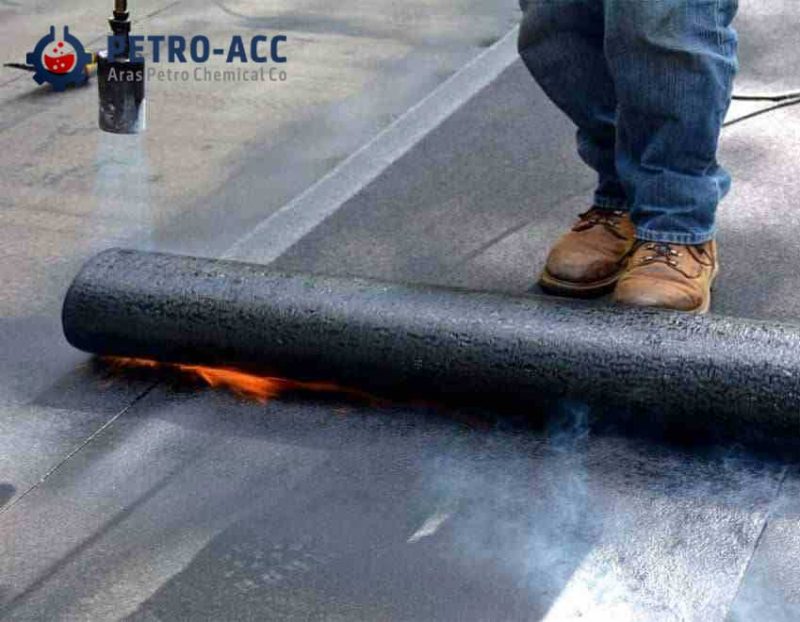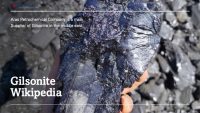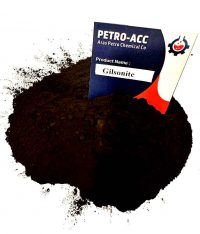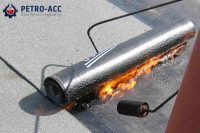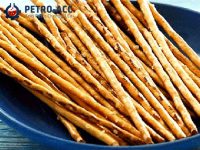Gilsonite in bituminous waterproofing membrane is used because Gilsonite is a naturally occurring mineral bitumen with unique physical and chemical properties. It is commonly used in the manufacturing of bituminous waterproofing membranes due to its excellent waterproofing and adhesive properties.
Bituminous waterproofing membranes are used to protect buildings and structures from water ingress and are commonly used in the construction industry. The membranes are made by impregnating a base material, such as fiberglass or polyester, with bitumen, a viscous black liquid derived from petroleum. Gilsonite can be added to bitumen to improve its properties.
When Gilsonite is added to bitumen, it enhances the adhesive properties of the material, making it more resistant to water and increasing its strength. Gilsonite also improves the flexibility and elasticity of the bitumen, making it more durable and less likely to crack or break under stress.
Overall, the use of Gilsonite in bituminous waterproofing membranes can result in a more effective and reliable waterproofing solution for buildings and structures.
BENEFITS OF USING GILSONITE IN BITUMINOUS WATERPROOFING MEMBRANE
Gilsonite, also known as natural asphalt, and is commonly used in the construction industry. When added to bituminous waterproofing membranes, natural asphalt can provide a number of benefits, including:
- Increased tensile strength: Gilsonite is a highly resilient material that can help improve the tensile strength of bituminous membranes. This can help ensure that the membrane stays in place, even under the stress of heavy loads.
- Improved resistance to weathering: Gilsonite is highly resistant to ultraviolet (UV) radiation and other environmental factors that can cause bituminous membranes to deteriorate over time. This can help extend the life of the membrane and reduce maintenance costs.
- Reduced permeability: Gilsonite has a low permeability to water and other liquids, which can help improve the waterproofing properties of bituminous membranes. This can help prevent water infiltration and reduce the risk of water damage to the underlying structure.
- Improved flexibility: Gilsonite is a flexible material that can help improve the flexibility of bituminous membranes. This can help ensure that the membrane can accommodate movement and deformation in the underlying structure without cracking or tearing.
- Improved adhesion: Gilsonite can help improve the adhesion of bituminous membranes to the substrate. This can help ensure that the membrane stays in place, even under the stress of heavy loads or high winds.
Overall, using Gilsonite in bituminous waterproofing membranes can help improve their performance, durability, and longevity.
METHODS OF ADDING GILSONITE IN BITUMINOUS WATERPROOFING MEMBRANE
The addition of Gilsonite to bitumen-based membranes can enhance the membrane’s strength, durability, and waterproofing properties.
There are several methods of adding Gilsonite to bituminous waterproofing membranes. Some of the common methods are:
- Dry-blend Method: In this method, Gilsonite is mixed with the dry bitumen powder before heating. The Gilsonite is typically added in a ratio of 5-10% by weight of the bitumen powder. The mixture is then heated and melted to form a homogenous mass, which is then used to produce the waterproofing membrane.
- Wet-blend Method: In this method, Gilsonite is first dissolved in a solvent such as toluene or xylene. The solution is then added to the hot bitumen and mixed until a uniform consistency is achieved. The resulting mixture is then used to produce the waterproofing membrane.
- Direct-melt Method: In this method, Gilsonite is added directly to the hot bitumen during the manufacturing process. The Gilsonite is typically added in a ratio of 5-10% by weight of the bitumen. The mixture is then stirred until a uniform consistency is achieved and then used to produce the waterproofing membrane.
- Co-extrusion Method: In this method, Gilsonite is added to the outer layer of the waterproofing membrane during the co-extrusion process. The Gilsonite is typically added in a ratio of 5-10% by weight of the outer layer material. The resulting membrane has enhanced strength and durability properties.
The choice of the method of adding Gilsonite depends on various factors such as the desired properties of the final membrane, the manufacturing process, and the equipment available.
HOW GILSONITE WILL DECREASE BITUMINOUS WATERPROOF MEMBRANE COSTS
Gilsonite is a naturally occurring hydrocarbon resin that has been used for many years as an additive in the manufacturing of bituminous waterproofing membranes. Adding Gilsonite to bituminous membranes can reduce the cost of the final product while also improving its performance.
Here are some of the ways that Gilsonite can help decrease bituminous waterproof membrane costs:
- Reducing the need for other additives: Gilsonite contains naturally occurring properties that can help to enhance the performance of bituminous membranes. By using Gilsonite, manufacturers may be able to reduce the amount of other additives needed in the production process, which can help to lower costs.
- Increasing durability: Gilsonite can improve the durability and resistance of bituminous membranes to environmental factors such as UV radiation, temperature fluctuations, and water exposure. This means that the membranes will last longer, reducing the need for frequent repairs or replacement and ultimately lowering overall costs.
- Reducing material costs: Gilsonite can be used as a substitute for other, more expensive materials commonly used in bituminous waterproofing membranes. This can help to lower material costs and make the final product more affordable.
- Enhancing performance: By improving the overall performance of bituminous membranes, Gilsonite can help to reduce the risk of leaks, cracks, and other damage. This can help to lower maintenance costs and increase the lifespan of the membrane, ultimately reducing the overall cost of the system.
In summary, the addition of Gilsonite to bituminous waterproofing membranes can help to lower costs by reducing the need for other additives, increasing durability, reducing material costs, and enhancing performance.



